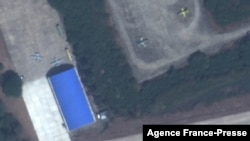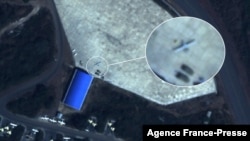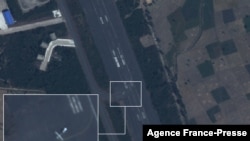Workers in a flour mill were the most recent victims of the weaponized drones that have become a key tool of combat in Ethiopia’s civil war.
The 17 victims, mostly women, were killed on January 10 near May Tsebri, a town in the Tigray region, as they gathered to grind grain. Witnesses say the unmanned aerial vehicles floated above the mill and then attacked.
“A witness told me that the drones came and hovered a bit before dropping bombs. Then people panicked but after some minutes everyone heard huge shouting and they went to the scene to see that women and donkeys died,” an aid worker told Agence France-Presse.
The United Nations says since the start of 2022, at least 108 civilians have been killed as a result of Ethiopian air force attacks in the Tigray region. Some attacks targeted camps for refugees and displaced people, the U.N. said.
Foreign-built drones have helped Ethiopian Prime Minister Abiy Ahmed turn the tide against Tigrayan forces in the 15-month civil war. But many are denouncing the civilian casualties and questioning the precedent armed drones set.
Wim Zwijnenburg is a humanitarian disarmament project leader with PAX, a Netherlands-based organization that studies global conflict and researches the use of military technology. He worries other countries may follow Ethiopia’s lead and use drones to address domestic challenges — military or otherwise.
“The concern with drone use in the region is that it lowers the threshold for the use of lethal force — in particular in situations which are not armed conflicts — which is very worrying, because those kind of means and methods can be easily seen as a sort of easy fix for a complex issue,” he told VOA in a video interview.
Other African countries, including Nigeria, have weaponized drones and foreign powers including the U.S. and France have conducted drone strikes on African soil against suspected terrorists.
Experts believe their use in the Ethiopian civil war goes a step further and may set off an arms race with other countries seeking to acquire the technology.
The Ethiopian government hasn’t kept its usage of drones a secret since the start of the war, sometimes touting the ability to conduct strikes remotely.
“This is a time where we can fight with a button,” Ethiopian Air Force Lt. Gen. Chief Yilma Merdasa said in November 2020, speaking to state media. “Sitting at a bureau, pressing the button we want, we can destroy the target. We’re building the air force this way.”
Despite a communication blackout in the Tigray region, international experts like Zwijnenburg sought tangible evidence to confirm where drones were being used and what types. In particular, they wanted to know where the drones were stationed and if they were being operated from neighboring Eritrea, where the United Arab Emirates has a military base it uses in the fight against Houthi rebels in Yemen.
Satellite images and cellphone video have helped experts fill in the blanks. Using satellite imagery, PAX identified Iranian-made Mohajer-6 drones and Chinese-made Wing Loong drones parked at Harar Meda Air Base in Bishoftu, Ethiopia. They have also identified Turkish TB2 drones, based at Bahir Dar in the Amhara region of the country.
Drone-based diplomacy
Iran has used drone or drone component sales as a way of cementing relations with groups in Iraq, Lebanon, Yemen and the Gaza Strip, according to Bellingcat, an open-source fact-checking website.
Zwijnenburg said there is evidence that Ethiopia is now on that list. He noted increasing flight traffic over the summer in and out of Ethiopia from Iranian airplanes, including one associated with the Iranian Republican Guard and sanctioned by the U.S. Treasury Department.
“They have been using and also exporting to various states and non-state actors in North Africa and the Middle East over the last couple of years,” Zwijnenburg said. “And even though the evidence is not conclusive, we clearly can indicate, based on the shape of the drone, the size, the armament and also the type of ground control station, which was shown on the footage, that there’s a strong indication that these are indeed Iranian armed drones.”
Turkey has also become a major player in the armed drone market. The news site Al-Monitor reported that Turkey sold 13 Bayraktar TB2 drones to Ethiopia. Reports of Turkish UAVs surfaced shortly after Prime Minister Abiy met Turkish President Recep Tayyip Erdogan in August and signed a military cooperation agreement. The Turkish Defense and Aerospace Industry listed a $51.7 million export to Ethiopia on their website.
Several email inquiries VOA sent to the Office of Ethiopia’s Prime Minister and to Billene Seyoum, the spokeswoman for the prime minister, asking for details about the purchase and use of drones went unanswered.
Experts say they fear that Turkey intends to sell armed drones to other African countries. Turkey currently has military cooperation agreements with 25 African countries and sold drones to Morocco.
Erdogan, who visited Africa last summer, recently bragged about how other countries are interested in acquiring the lethal technology.
“Even in Africa, they asked for drones and armed drones wherever I went,” Erdogan said in October, while visiting the factory of the Turkish drone maker Baykar, Al-Monitor reported.
The proliferation of drones is setting off alarm bells among security experts and human rights activists, who fear the weapons will be used without restriction, including possible use against political opponents, dissidents, or marginalized groups.
When asked about Ethiopia’s drone use in September, a senior White House official said it is complicating efforts to end the war.
“Having increased use of weaponry is not the way that’s going to stabilize Ethiopia, that’s going to address the grievances that Ethiopians have, that’s going to lead to the type of prosperity that [Abiy] himself says is his goal for Ethiopia,” the White House official said during a call with reporters.
Zwijnenburg has similar concerns.
“With the increase of exports and proliferation of drones, including to Africa, our concern is that more African states will be applying this method of using armed drones,” he said. “Even in domestic operations against suspected militants, I think that’s a larger concern, which I think African states, including and also the African Union, should address and there are various civil society groups and legal experts in Africa who’ve expressed those concerns.”















